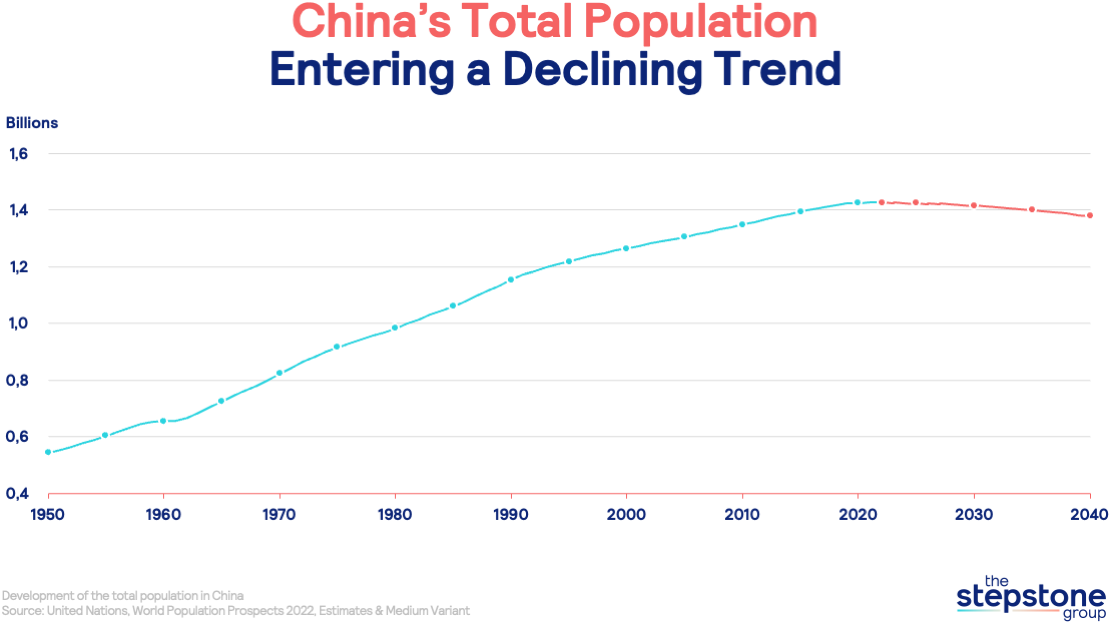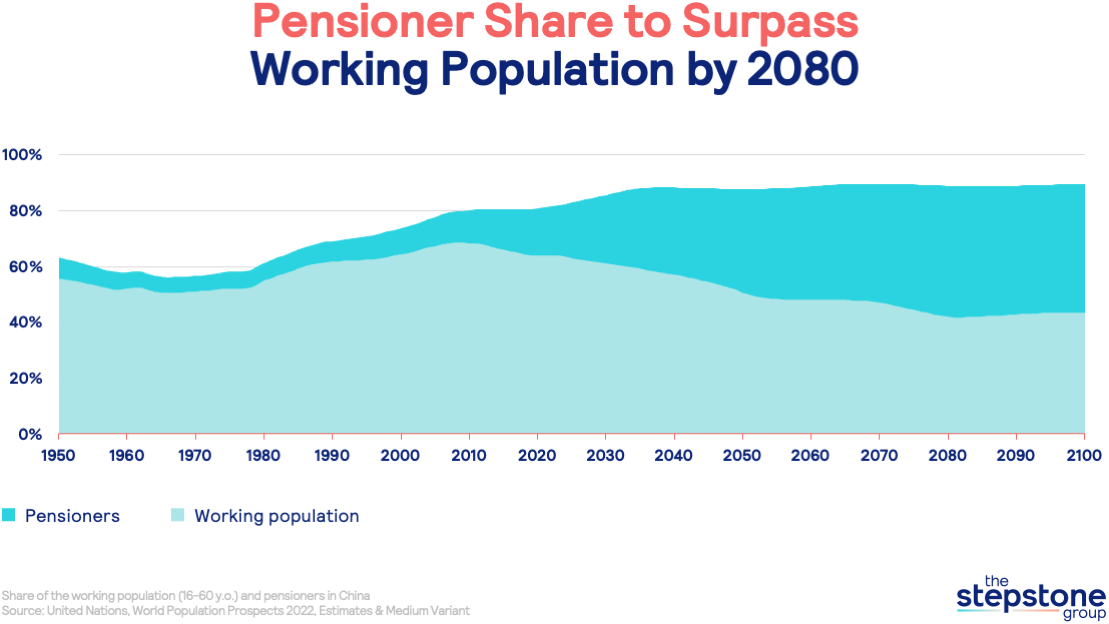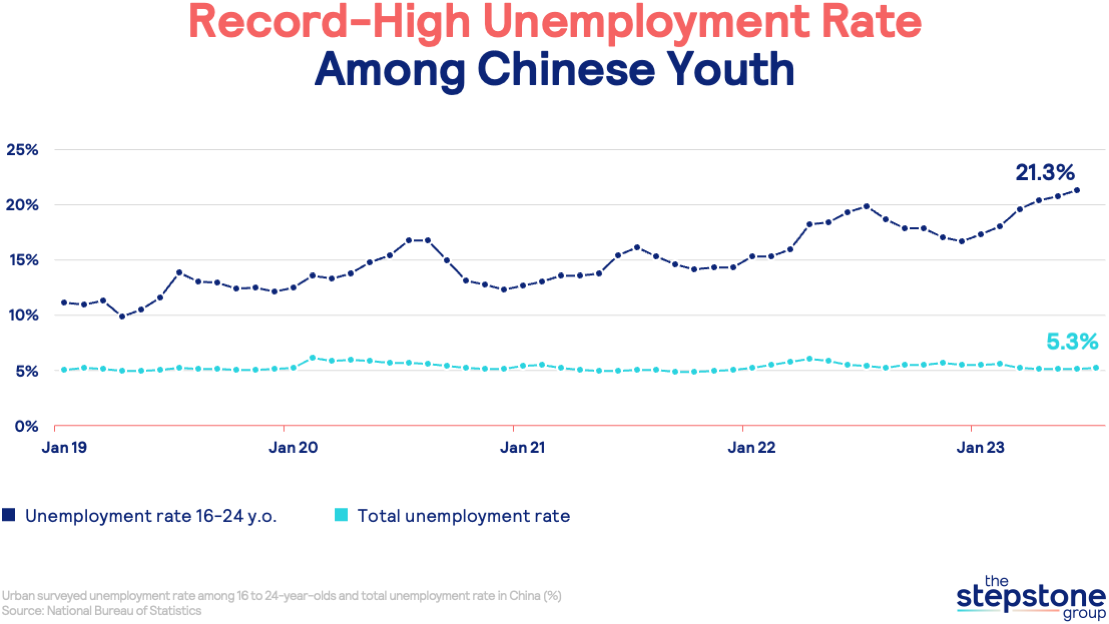The phrase "full-time children" pertains to graduates who, unable to secure employment, opt to return to their parent's homes. They engage in household chores and meal preparation and receive financial support from their parents as compensation.
Let’s begin by taking a broader perspective. China is grappling with profound demographic challenges. In January 2023, the National Bureau of Statistics of China confirmed the first population decline, a decrease of 0.85 million compared to the figures at the close of 2021. China’s population is now anticipated to consistently decline, with projections indicating a reduction of 10 million by 2030.

Furthermore, as delineated by the United Nations Population Prospect of 2022, China’s working-age population (aged 16 to 60) has already reached its peak in 2012 at 926 million, with the share of the working population declining since 2009. The conditions in the labor market will shift completely in the next 50 years. At the latest in 2080, when the proportion of pensioners will exceed the proportion of the working population in China.

Most Western countries experience a similar development of a shrinking working population, accompanied by increased labor shortages and lower unemployment rates. The majority of graduates are aware of this and anticipate a promising future: In a recent Stepstone survey, younger employees (aged 20-29) from Germany, the US, and the UK assessed their position in the labor market as advantageous, holding more power than companies when negotiating a job offer (Stepstone, Future.Work.Today., 2022).
Therefore, it is not surprising that many are correspondingly self-confident when it comes to looking for a job. Gen Z is undoubtedly well educated, they are digital natives, in fact as they have grown up with digital technologies. These aspects make them very attractive to employers. Moreover, they know that they are a relatively small group and that their value is accordingly high.
The paradox of overeducation and unemployment
China's labor landscape is in flux, with 16.62 million new jobseekers entering the fray. This figure is projected to surge further, fueled by an anticipated 11.6 million college graduates, as stated by Huai Jinpeng, China's Minister of Education.

Alarming statistics underscore this trend, with the unemployment rate among 16- to 24-year-olds hitting a record high of 21.3%. This contrasts starkly with the overall unemployment rate of 5.3%. But why is a substantial number of graduates facing joblessness and even contemplating returning to familial employment?
The many reasons behind youth unemployment in China
Lack of high-paying, high-skilled jobs
Numerous contributing factors have been discussed: First, there is a lack of high-paying, high-skilled jobs. Although China's industrial structure is transforming, the transition from labor-intensive industries to high-value-added sectors such as technology and high-level services still needs to be completed.
An overabundance of highly qualified youth
Simultaneously, China has the largest education system in the world. However, this has led to an overabundance of highly qualified Chinese youth juxtaposed against the limited scope of available job opportunities. This highlights the mismatch between their education and the prevailing job market demands.
Skills mismatch
Many job seekers target positions in real estate, finance, and private education. However, these sectors are marked by fierce competition, and only a few will successfully secure employment. While opportunities exist in industries like manufacturing and agriculture, they may not align with the aspirations of the educated elite, creating a discrepancy between desired and available roles.
Escalating costs of living
This is further exacerbated by the escalating cost of living, which has outpaced wage growth. As a result, young graduates resist accepting compensation levels offered by firms and may eventually move back in with their parents as “full-time children,” where they take on the role of being financially dependent on their parents while also contributing to household chores and responsibilities.
So, what can we learn from diving deeper into this trend?
The “full-time children” trend emerges from a complex interplay of social and economic transformations. Even though the number of vacancies remains high in Western societies, some aspects are transferable.
Automation and high-skill jobs for career advancement and economic independence
First, the lack of high-paying, high-skilled jobs will have long-term consequences for the career development of an entire generation. After years of studying, these young adults still find themselves financially dependent on their families, unable to establish independence and financial autonomy. Moreover, if young individuals are forced to take on low-skilled or unrelated jobs, developing the skills and experiences necessary for career advancement might become more challenging.
In Germany, still, a large share of the workforce is employed in the low-wage sector. According to the Statistisches Bundesamt, in 2022, almost one in five jobs paid less than € 12.50 gross per hour. To tackle this, both governmental bodies and employers must upgrade by investing in automation to diminish the reliance on labor-intensive, repetitive roles but also increase the availability of high-skilled and high-level jobs.
Ensuring skills match the job requirements
Second, a crucial lesson is the imperative of aligning personal skills with the demands of their job. Misalignment does not only detrimentally affect individuals’ motivation, but it it also leads to decreased efficiency, thereby negatively influencing economic growth.
However, as our latest research indicated, also Western economies must improve on this issue, as only one out of three employees from Germany, the UK, and the US report a full person-job fit (The Stepstone Group, The Engagement Advantage, 2023).
Elevated salaries boost automation, productivity and higher-skilled employment
Third, higher living costs increase the pressure on the younger generations, many were struggling to cover their basic living costs. In Germany, one out of five stated in November that they had to draw on their savings. Almost one out of ten responded that they needed an additional job or government assistance (Verband privater Bausparkassen, 2022). Higher salaries would not only support individual needs but create incentives for the state and companies to automate simple tasks, thereby fostering heightened productivity by reallocating employees towards higher-skilled jobs.
Although China is facing a seemingly different situation in the labor market, considering the phenomenon of “full-time children”, similar developments like “lying flat” (i.e., the personal rejection of societal pressures to overwork and over-achieve) are also visible in our markets. The ongoing discourse surrounding the younger generation’s scrutiny of existing working models is gaining more and more attention. The developments in China and Western societies underline the need to find solutions for the ongoing challenges in the labor market. There's a pressing need to bridge the gap between the expectations of the youth and the realities of the labor market. It‘s perhaps less about the number of hours worked and more about job characteristics. And that may be the good news here. Given the rising bargaining power of young professionals due to demographic shifts, companies currently have a prime opportunity to outpace their competition by creating and filling the jobs that really matter.